From October 14 to 18, the "2024 Tourism Data and Tourism Statistics Talent Capacity Improvement Advanced Training Course" co-organized by the China Tourism Research Institute (Data Center of the Ministry of Culture and Tourism) and the Anhui Provincial Department of Culture and Tourism and hosted by the Chizhou Municipal Bureau of Culture and Tourism was successfully held in Chizhou City, Anhui Province. Dai Bin, President of the China Tourism Research Institute (Data Center of the Ministry of Culture and Tourism), Hai Yan, Second-level Inspector of the Anhui Provincial Department of Culture and Tourism, Tian Xin, Deputy Secretary of the Chizhou Municipal Party Committee and Minister of the Propaganda Department, and Chu Xiaoyan, Deputy Mayor of Chizhou City attended the opening ceremony. Experts and scholars from the Department of Finance of the Ministry of Culture and Tourism, the National Bureau of Statistics, the China Tourism Research Institute, Renmin University of China, the Hunan Provincial Department of Culture and Tourism, China Mobile Communications Group, Hangzhou Municipal Bureau of Culture, Radio, Film and Tourism, Anhui Classic Market Research Consulting Co., Ltd. and other units gave special lectures. Nearly 200 people from tourism authorities, statistical business backbones of relevant enterprises and institutions across the country and the Anhui Provincial Culture and Tourism System participated in the course training on site. 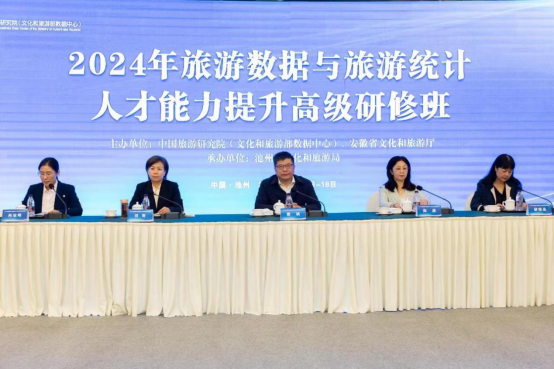
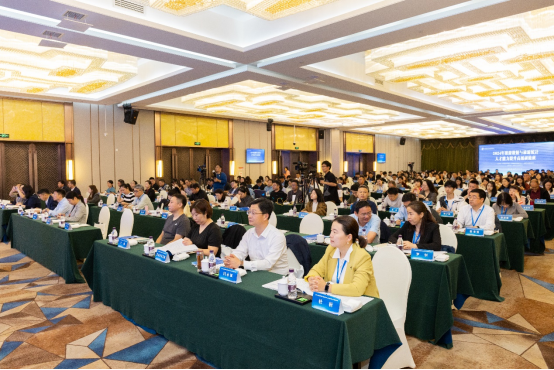
On behalf of the Chizhou Municipal Party Committee and Municipal Government, Tian Xin welcomed the leaders, experts and trainees who participated in the seminar, and expressed gratitude to people from all walks of life who have long been concerned about and supported the economic and social development of Chizhou. She hopes to communicate with everyone, learn from each other's strengths and weaknesses, and jointly promote the high-quality development of Chizhou's cultural and tourism industry. Haiyan pointed out in her speech that this seminar is large in scale, high in quality and strong in strength. She expressed her sincere gratitude to President Dai and the Data Center of the Ministry of Culture and Tourism for their support and affirmation of the tourism statistics work in Anhui Province and Chizhou City. She hoped that all trainees would strengthen communication and exchanges and constantly explore new ideas and new models for the development of tourism statistics. President Dai Bin expressed his sincere gratitude to the Anhui Provincial Department of Culture and Tourism and the Chizhou Municipal Party Committee and Municipal Government for their strong support, and also thanked the members of the Tourism Data and Tourism Statistics Cooperation Network of the Institute for their long-term hard work. President Dai Bin pointed out that in the work of tourism statistics and data production, we must face not only scientific problems, but also philosophical problems, and literary problems, and we must be "clear in mind". First, the accuracy of tourism data and statistical samples are key issues related to the scientific nature of tourism statistics. The data source should follow the principle of "direct collection as the main source, multi-source heterogeneity". The statistical department should explain the source of data collection clearly, and the principles and methods of the production process should be able to withstand the test. Second, tourism data plays an important role in seeing the essence of the industry, promoting consensus, and eliminating misunderstandings in public opinion. It is necessary to adapt to the changes in new tourism scenes, new formats, and new forces, constantly innovate the tourism economic indicator system, and insist on singing the bright theory of China's economy. Third, "a thousand words are not as good as a group of data". We must learn to think about the methods of reporting data and the writing of data reports from the perspective of readers' needs and audiences, stimulate empathy, and hit people's hearts. Dai Bin finally emphasized that tourism statistics and data are not only professional issues, but also political issues. We must strengthen theoretical learning, delve into technical methods, and improve professional capabilities; we must develop good habits such as handwritten data reports, hand-filled calculated data, and strengthened archive awareness; we must enhance the sense of industry community and reach a consensus on basic theories, technologies, and methods such as tourism statistics and data. At the opening ceremony, Dean Dai Bin issued statistical sample database cooperation certificates to 10 offline sample database construction backbone cooperation units, 10 outstanding liaison representatives, and 17 second-batch units, including Anhui Classic Market Research Consulting Co., Ltd., Beijing Jingchengxing Information Co., Ltd., Chongqing Culture and Tourism Information Center, Fujian Huatong Market Research Co., Ltd., UnionPay Business Co., Ltd., Henan Open University Smart Culture and Tourism Industry College, Lixin (Chongqing) Data Technology Co., Ltd., Zhejiang Rural Tourism Research Institute of the National Rural Tourism Monitoring Center, Shandong Technology and Business University, and Hebei Culture and Tourism Innovation and Development Center. 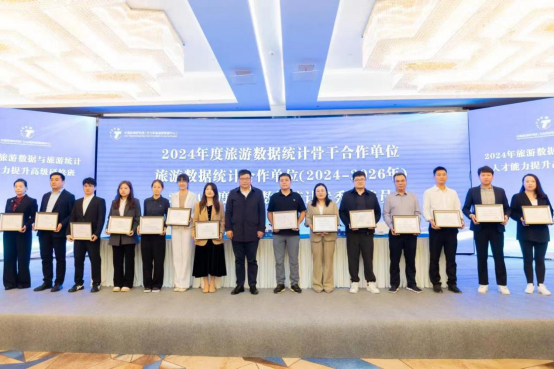
The opening ceremony also awarded the 2024 Tourism Data and Tourism Statistics Typical Case Certificates for 10 projects, including the Innovation of Fujian Province's Cultural and Tourism Economic Accounting, Hunan's Cultural and Tourism Industry Integration Statistics Innovation, Guangdong's Study Tour Big Data Evaluation Index Design and Application, Hangzhou's Cultural and Tourism Data Online, Guilin's Holiday Tourism Data Statistics and Measurement Intelligent Platform, Handan County Tourism Data Measurement Practice, Tourist Monitoring Based on Signaling Big Data - Taking Zhejiang Province as an Example, Tourism Statistics Innovation Based on Payment Big Data - Taking Jiangsu Province as an Example, Nanjing Rural Tourism Big Data Service Platform, Xinjiang Tourism Statistics and Multivariate Big Data Convergence Platform. 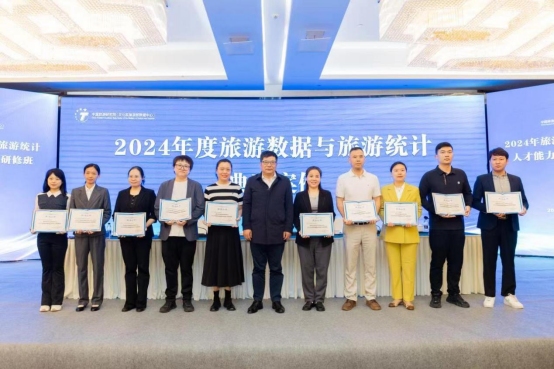

In the teaching of statistical system and theory, Wan Donghua, former director of the Social Science and Culture Department of the National Bureau of Statistics, explained the key content and shared classic cases on the topic of national statistical trends and legal systems. Fan Bochen, from the Planning and Statistics Division of the Finance Department of the Ministry of Culture and Tourism, focused on the work of tourism statistics, strengthened the construction of relevant systems and regulations for tourism statistics, improved the ability of statistical rule of law, and continuously created a good tourism statistics ecological environment. Professor Zhao Yanyun of the School of Statistics of Renmin University of China systematically explained the statistical theoretical methods of statistical data analysis and its application in tourism statistical analysis. In the teaching of data application, Ma Yiliang, chief statistician of the China Tourism Research Institute, taught the understanding of tourism from the perspectives of anthropology, economics, aesthetics and phenomenology, explained how tourism activities returning to the life world can satisfy people's core social motivations, and talked about the outstanding problems encountered in the current tourism statistics work and their normative explanations. He Qiongfeng, director of the Statistics and Survey Institute of the China Tourism Research Institute, focused on the relationship between big data and tourism statistics and the application of big data in tourism statistics, and shared the tourism economic operation monitoring system and the current tourism economic situation. In the practical sharing teaching, Wang Xuezhong, Chairman of Anhui Classic Market Research Consulting Co., Ltd., explained the innovation of tourism statistics in Anhui Province from the perspective of strengthening the statistical foundation, digging deep into the statistical value, and empowering statistics with data. Luo Heng, Deputy Director of the Finance Department of the Hunan Provincial Department of Culture and Tourism, shared the statistical innovation of the integration of Hunan's cultural and tourism industries. Bo Wengan from the Cultural Tourism Development Center of the Hangzhou Municipal Bureau of Culture, Radio, Film and Tourism shared the Hangzhou exploration case of tourism monitoring and data openness based on big data. Wang Xuejian, Deputy General Manager of the Big Data Product R&D Center of China Mobile Information Technology Center, explained the work experience of tourism dynamic monitoring technology and application based on mobile phone signaling data. In the group discussion session, six groups of trainees respectively focused on the difficulties and doubts encountered in tourism statistics work, suggestions for the application of big data in tourism statistics, typical cases and advanced practices of tourism data and tourism statistics, and the normalized working mechanism of tourism data training classes, and jointly promoted statistical and data standards, general technical specifications, and better construction of offline sample libraries. 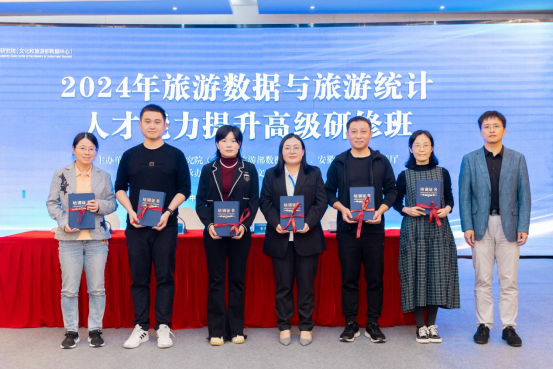
At the closing ceremony, Zhang Jigao, director of the Shandong Branch of the Ministry of Culture and Tourism Data Center, Wang Wei, deputy section chief of the Publicity Center of the Beijing Municipal Bureau of Culture and Tourism, Qiu Xun, director of the Digital Culture and Tourism Department of the Quzhou Municipal Bureau of Culture, Radio, Film and Tourism, Li Wei, Anhui Provincial Department of Culture and Tourism, Zhu Haiyan, operations director of Anhui Classic Market Research Consulting Co., Ltd., and Yuan Yue, director of the Suixi County Bureau of Culture, Tourism and Sports, spoke one after another. It was unanimously agreed that the schedule arrangement, expert lectures and case sharing of this training course were very attentive, and a high-level tourism statistics work exchange platform was built. As a representative of the organizer, Li Fenghua, deputy director of the Chizhou Municipal Bureau of Culture and Tourism, expressed his gratitude for the support of our institute and colleagues from all over the country, and congratulated the successful holding of the training course. Ma Yiliang, chief statistician of the China Tourism Research Institute, further emphasized the importance of tourism statistics work and knowledge reserves in related fields at the closing ceremony, and suggested that tourism statistics and tourism data personnel should continuously improve their professional capabilities and enhance their fighting spirit and dedication. Contributor | Statistical Survey Institute Editor | Liu Xin Source | China Tourism Research Institute (Data Center of the Ministry of Culture and Tourism) Please indicate the source for reprinting